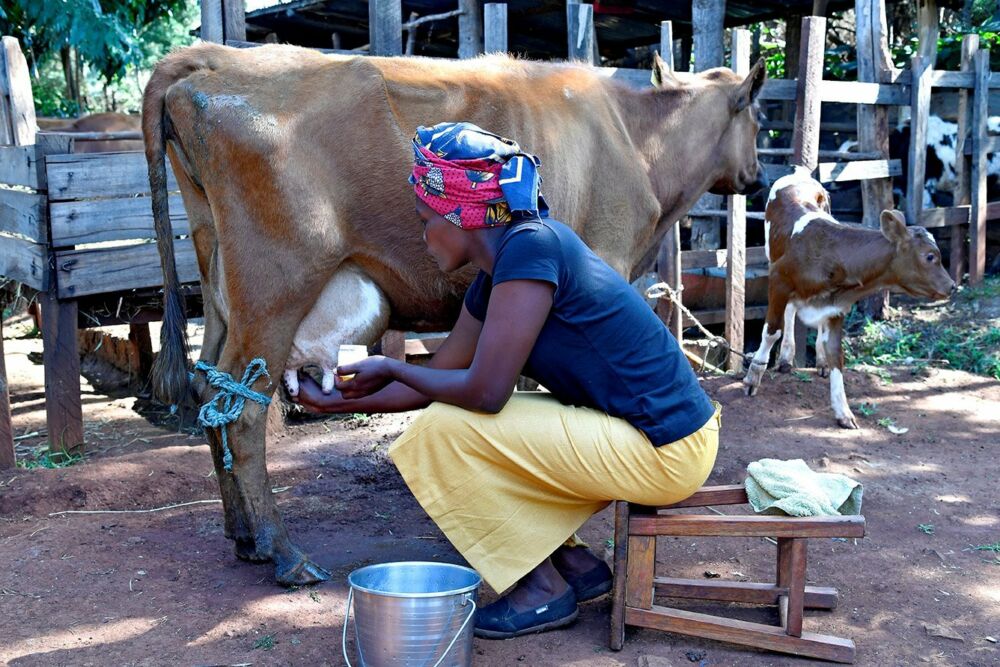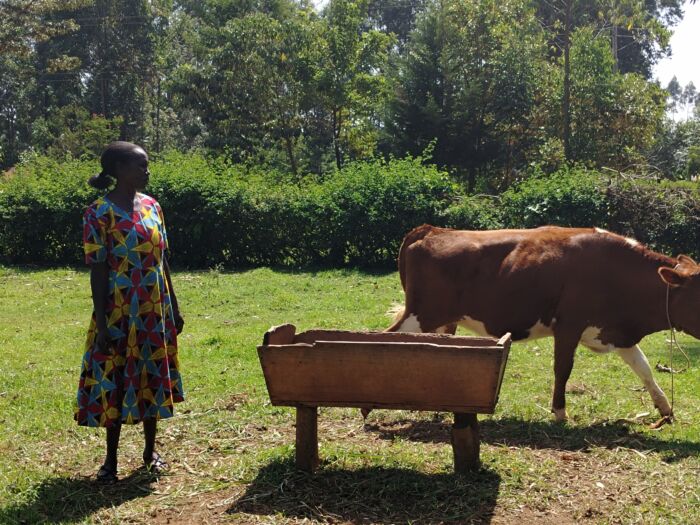Gender Equality in Land Use: Harnessing the Potential of Men and Women
Date
March 8, 2024
A woman milks a cow at Vi Agroforestry Training Center, Kitale Kenya Photo by: Ferdinand Okinyi
Reducing gender inequalities in livelihoods and resilience is critical in fighting poverty and climate change, which is Vi Agroforestry’s vision. Our work for the past 40 years has centered on Agroforestry and Sustainable Agricultural Land Management (SALM) practices.
One of the major sub-programs for Vi Agroforestry, Kenya is the Livelihoods, Mt. Elgon Project (LMEP), implemented inTrans Nzoia and Bungoma counties. In partnership with Western Tree Planters Association (WETPA), the project aims at improving the livelihoods of 15000 smallholder farmers by empowering them through sustainable farming and milk-water-carbon value creation as well as establishing connections to markets through 15 cooperatives. It is estimated that the project will sequester more than 1 million ton of CO2 equivalent.
The Mt. Elgon social- cultural context is highly patriarchal, with long-held biases against women’s access to, use of, and ownership of land. 78% of the targeted households in LMEP are male headed households. In these, women are left out in key decisions on land use, labour, and benefit sharing of land resources and products.
It has therefore been imperative that the Gender Transformative Approach (GTA) be a key approach in dealing with gender inequality in this region. Gender transformative approaches seek to challenge gender inequality by transforming harmful gender norms, roles, and relations, while working towards redistributing power, resources, and services more equally. The GTA approach engages men and women together as agents of change, instead of encumbering women with the responsibility of fighting for equality.
In this recognition, together with WETPA, the project embarked on the adoption of the Household Road Map (HRM), a tool that encourages joint decision making in a household over resources, recognizing each household member’s contribution and role in land use and management at farm level. After rolling out of the HRM tool, the project was able to increase the number of households that practice joint decision – making of men and women on land use from 16% to 60%; joint decision making of labour at household from 17% to 32%, and joint decision making from the income from the Land use from 28% to 70% of the households.

“ Engage Men in Gender Transformation in Land Use, it pays” ~Ferdinand Okinyi, Project Manager Mount Elgon Livelihood Project~
In addition to farming, the project also promotes Village Savings & Loaning Associations (VSLAs) with the aim supporting common interest activity that fosters group cohesion. It also empowers women to access credit to meet practical needs like food, education for their children and agricultural inputs. 12,320 farmers are participating in the village savings and loan association, 7920 of the farmers are women.
As a result of the interventions, including the HRM tool, the daily average milk production per cow per day increased by 14% from 4.03 litres in 2022 to 4.6 litres in 2023. As a result of the enhanced adoption of sustainable technologies including Agroforestry, the area under Sustainable Agriculture Land Management increased by 26% from 8,640 hectares in 2022 to 10,867 hectares in 2023.
While actual empirical evidence on the impact of the gender transformative approaches may not be separated from the results of overall livelihood interventions, the impact of GTA is evident, and offers opportunity to transition different contexts such as the Mt. Elgon region from pervasively slow or regressive towards gender equality, to a substantive and sustainable progress.